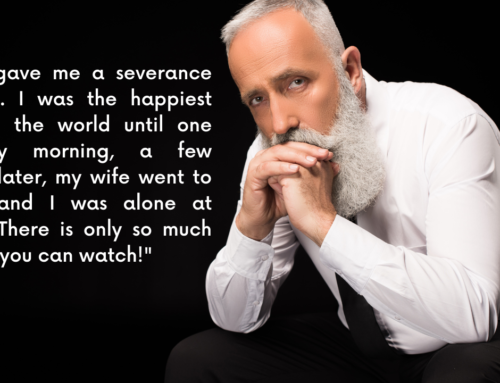After forty-five years of an incredibly successful career in the insurance industry, Ben decided it was time to retire. The first few weeks were blissful. He slept in, caught up with old friends and spent time with his grandchildren. But as the weeks rolled into months, he found himself in uncharted territory. He tried taking up hobbies: golfing, gardening, reading, even painting. But nothing seemed to compare to the excitement of closing a big deal or innovating a new product. He missed having something to aspire to – a goal, a purpose, the external validation that accompanies professional achievements. Ben had no retirement goals.
One of the more significant, yet often overlooked challenges with retirement is the process of setting personal goals after decades of externally defined objectives. Throughout our lives, it is others who set goals for us.
In school, teachers assign projects, essays, and exams. These assessments promote the development of critical skills, and they also serve as a measure of accomplishment. Accomplishments, both big and small, provide concrete evidence of one’s abilities. When we succeed in accomplishing a goal, it validates that we possess the requisite skills, knowledge, and capabilities, to master a specific task, concept, or subject, which in turn boosts our self-confidence.
At work, managers set targets, be they sales quotas, client satisfaction levels, or project deadlines. These goals provide a focus for our daily tasks, annual performance objectives, and advancement opportunities.
Once you leave work, you are now solely responsible for setting retirement goals
Retirement represents a significant shift in this paradigm. For the first time, many people find themselves solely responsible for setting their own goals which can be overwhelming. The lifetime structure of school and work suddenly vanish, leaving a void that can prove challenging to replace.
Establishing personal goals requires a level of self-awareness as it involves asking tough questions as:
- What truly makes me happy?
- What do I most value?
- How do I want to spend my time and talents?
These introspective inquiries may be daunting but are essential for shaping meaningful retirement goals.
When we think of retirement goals, we often think of financial goals. The finance part, however, is the easier part of the equation (while I say easier understand it is all relative. I wouldn’t go at the financial stuff alone!).
The other stuff, such as with what are you going to replace all those working hours (and don’t tell me golf because golf will become boring when all you do is golf) are so much harder to answer.
And friends, we all need goals. Especially for those of us who consider achievement as being an important part of our lives. This need will not disappear the day you retire. You don’t suddenly wake up a new person when you leave work.
Before you retire, find ways other than accomplishments to nurture self-confidence
The best thing you can do for yourself before retiring, and for those of you at an earlier stage in your career, is to understand that while accomplishments can and do contribute to feelings of self-esteem and satisfaction, they should not be the only way you evaluate the meaning of your life. Basing your worth solely on accolades leads to stress, anxiety, depression and unhappiness. Think of Ben.
In my work as a retirement researcher and consultant, I have listened to people describe the retirement experience as a trauma, akin to losing a limb or being lost at sea without an anchor. And who wants to go through life without an anchor- vulnerable to the wind and currents, defenceless against rising tides.
But anchors also prevent people from moving forward
And while anchors provide safety and security, they can also keep us stuck, shackled to a past self that prevents us from pursuing new roles and opportunities.
Conventional wisdom encourages us to reflect on the life transitions we have yet to experience. But I think leadership professor Dr. Herminia Ibarra has a better way of approaching milestone events. Ibarra explains,
“When we look only within for answers, we inadvertently reinforce old ways of seeing the world and outdated views of ourselves”.
Outsight, a concept coined by Ibarra, refers to gaining new insights, perspectives, and skills by actively seeking novel experiences and engaging with diverse people, environments, and ideas outside of our current ecosystems. Ibarra does not negate the importance of reflection, but she maintains contemplating matters you have yet to experience will not provide any data that is likely to change your thinking or inform how you feel – for that we need new experiences.
When you intentionally step outside your comfort zone and expose yourself to unfamiliar situations that challenge existing assumptions and ways of thinking, you give yourself new experiences to reflect upon – new data to contemplate!
That applies if you are a leader in a formal organization and it also to applies to you – because it is you that plays the leading role in your life!
It is important to have retirement goals. And your goals should include experimenting with new ways of living, being and doing.
In the year that we worked together, Ben joined the local chamber of commerce, enrolled in a Tai Chi class, picked up photography, learned he did not like cooking classes, was surprised that he loved teaching and settled into a new life, with new interests and eventually a new rhythm. But it wasn’t always easy, and it wasn’t always fun.
It is in these experiences, however, that we start to learn who we are and who we want to become.
Need some guidance on this journey and want to have some fun along the way, join our course, Reinventing Retirement, try Retirement Coaching or invite your employer to host a pre-retirement seminar.
To your Retirement Success!
Dr. Gill


